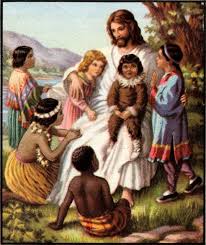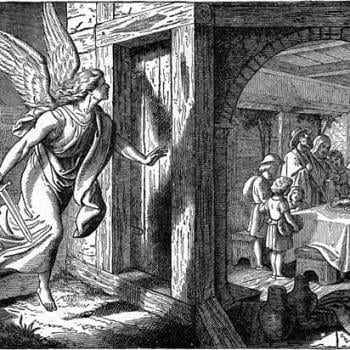THE KOAN OF OUR LIVES
Zen, the Ten Commandments, & the Beatitudes
James Myoun Ford
The other day one of my companion Patheos bloggers, Professor Gene Veith shared a post reflecting on the Ten Commandments and the Sermon on the Mount. His post played off an opinion piece by mega-church pastor Andy Stanley. The pastor apparently having opined how Christians shouldn’t be obsessed with monuments to the Ten Commandments in the public square. Rather, he seems to have suggested, it would be better to erect monuments celebrating the Sermon on the Mount. The professor demurred.
The professor was in fact appalled at any suggestion Christians might not be bound by the commandments. Which he claimed the pastor was advocating. In his response to the pastor he gives little attention to the beatitudes. A sort of balancing of things, I guess. Rather he was worried about the terrible things that would follow a rejection of Jewish and implicitly Christian moral codes captured in the Ten Commandments.
He takes an interesting aside into whether Marcionism, the specific heresy into which he accuses the pastor of falling, is anti-semitic. Could be. Of course that lets the question of whether the pastor maybe, possibly, could be, especially if you squint, be anti-semitic. Me, I find that more a move from argument and to polemics. And, as a sympathetic outsider, not the most fruitful territory.
Now as a Zen Buddhist there is a bit of not my circus, not my monkeys. However. I am a Zen Buddhist. But I am also a universalist. Universalist defined here as confidence that the healing of broken hearts can be found within all religions and, yes, without any. Some are perhaps clearer on the subject. That the many religions have such different angles into the mess is itself worth noticing. And, gaining that bit of distance can be very helpful.
So, as a Zen Buddhist I very much can appreciate the Ten Commandments. And being just a little humble, I can learn things.
There are two lists that become the commandments in the Hebrew Scriptures. One captured in Exodus (20:1-17) and in Deuteronomy (5:4-21). The Wikipedia article attempts to sort them out.
| LXX | P | S | T | A | C | L | R | Main article | Exodus 20:1-17 | Deuteronomy 5:4-21 |
|---|---|---|---|---|---|---|---|---|---|---|
| — | — | — | 1 | — | 1 | — | (1) | I am the Lord thy God, which have brought thee out of the land of Egypt, out of the house of bondage. | 2[10] | 6[10] |
| 1 | 1 | 1 | 2 | 1 | 1 | 1 | 1 | Thou shalt have no other gods before me | 3[11] | 7[11] |
| 2 | 2 | 1 | 2 | 1 | 1 | 1 | 2 | Thou shalt not make unto thee any graven image | 4–6[12] | 8–10[12] |
| 3 | 3 | 2 | 3 | 2 | 2 | 2 | 3 | Thou shalt not take the name of the Lord thy God in vain | 7[13] | 11[13] |
| 4 | 4 | 3 | 4 | 3 | 3 | 3 | 4 | Remember the sabbath day, to keep it holy | 8–11[14] | 12–15[15] |
| 5 | 5 | 4 | 5 | 4 | 4 | 4 | 5 | Honour thy father and thy mother | 12[16] | 16[17] |
| 6 | 7 | 5 | 6 | 5 | 5 | 5 | 6 | Thou shalt not kill | 13[18] | 17[18] |
| 7 | 6 | 6 | 7 | 6 | 6 | 6 | 7 | Thou shalt not commit adultery | 14[19] | 18[20] |
| 8 | 8 | 7 | 8 | 7 | 7 | 7 | 8 | Thou shalt not steal | 15[21] | 19[22] |
| 9 | 9 | 8 | 9 | 8 | 8 | 8 | 9 | Thou shalt not bear false witness against thy neighbour | 16[23] | 20[24] |
| 10 | 10 | 9 | 10 | 10 | 10 | 9 | 10 | Thou shalt not covet (neighbour’s house) | 17a[25] | 21b[26] |
| 10 | 10 | 9 | 10 | 9 | 9 | 10 | 10 | Thou shalt not covet (neighbour’s wife) | 17b[27] | 21a[28] |
| 10 | 10 | 9 | 10 | 10 | 10 | 10 | 10 | Thou shalt not covet (neighbour’s slaves, animals, or anything else) | 17c[29] | 21c[30] |
| — | — | 10 | — | — | — | — | — | You shall set up these stones, which I command you today, on Mount Gerizim. | 14c[31][32] | 18c[33][34] |
And here’s a key to understand how the list is used by various Jewish & Christian groups.
- LXX: Septuagint, generally followed by Orthodox Christians.
- P: Philo, same as the Septuagint, but with the prohibitions on killing and adultery reversed.
- S: Samaritan Pentateuch, with an additional commandment about Mount Gerizim as 10th.
- T: Jewish Talmud, makes the “prologue” the first “saying” or “matter” and combines the prohibition on worshiping deities other than Yahweh with the prohibition on idolatry.
- A: Augustine follows the Talmud in combining verses 3–6, but omits the prologue as a commandment and divides the prohibition on coveting in two and following the word order of Deuteronomy 5:21 rather than Exodus 20:17.
- C: Catechism of the Catholic Church, largely follows Augustine.
- L: Lutherans follow Luther’s Large Catechism, which follows Augustine but subordinates the prohibition of images to the sovereignty of God in the First Commandment[35] and uses the word order of Exodus 20:17 rather than Deuteronomy 5:21 for the ninth and tenth commandments.
- R: Reformed Christians follow John Calvin‘s Institutes of the Christian Religion, which follows the Septuagint; this system is also used in the AnglicanBook of Common Prayer.[36]
(The commandments also have a place in Islam. And worth its own reflection. But their approach is sufficiently different to fall outside what I am reflecting on here.)
In Judaism and Christianity the commandments hold up a relationship with the divine as primary. After that, maybe flowing out of that, are various restrictions and admonitions. Killing, or, at least murder is prohibited. Adultery, lying, and theft are forbidden. Honor across generations is commended, and specifically for one’s parents.
The article on the commandments at Wikipedia speaks to their implementation.
“The Ten Commandments are written with room for varying interpretation, reflecting their role as a summary of fundamental principles. They are not as explicit or detailed as rules or many other biblical laws and commandments, because they provide guiding principles that apply universally, across changing circumstances. They do not specify punishments for their violation. Their precise import must be worked out in each separate situation.”
This reminds me of the Korean Zen master Seung Sahn, who would like to posit situations in which keeping one of the Mahayana precepts necessitated the breaking of another. Any moral code to be authentic has to be dynamic. And, it is interesting that this code is elastic in that manner. So, out of the mouths of ancients, with perspectives we can only guess at from this distance, something worthy. No doubt. No argument.
And. for me it’s the Beatitudes that speak most deeply. As a person walking the Zen way, I know I can profit from listening to the wisdom of the commandments. But, it is the wisdom of the beatitudes that actually capture my heart.
There are eight of them. Four are presented in Luke. Those and the rest are captured in Matthew.
The four in Luke, said to be related in a sermon in the plain, read:
“Blessed are you who are poor,
for yours is the kingdom of God.
Blessed are you who hunger now,
for you will be satisfied.
Blessed are you who weep now,
for you will laugh.
Blessed are you when people hate you,
when they exclude you and insult you
and reject your name as evil,
because of the Son of Man.”
These four and four more are collected in Matthew’s sermon on the mount:
“Blessed are the poor in spirit,
for theirs is the kingdom of heaven.
Blessed are those who mourn,
for they will be comforted.
Blessed are the meek,
for they will inherit the earth.
Blessed are those who hunger and thirst for righteousness,
for they will be filled.
Blessed are the merciful,
for they will be shown mercy.
Blessed are the pure in heart,
for they will see God.
Blessed are the peacemakers,
for they will be called children of God.
Blessed are those who are persecuted because of righteousness,
for theirs is the kingdom of heaven.”
I think about these words a lot. I’ve reflected on them from time to time and place to place. What follows is a bit fuller reflection.
Of course in our time and place, I suspect it is hard to think of the Beatitudes without also recalling that bit in the Life of Brian and those people stuck at the very back of the crowd when Jesus delivers his words from so very, very far away. A man says, “I think it was, ‘Blessed are the cheese makers!’” And with that the wife asks the obvious question, “What’s so special about the cheese makers?” To which the husband replies, “Well, obviously it’s not meant to be taken literally. It refers to any manufacturer of dairy products.”
What was said on the other side of that great game of telephone that has been repeated across the ages, and even when first written down a full generation after he spoke, could take up any amount of time we might want to devote to it. The famous, for some infamous Jesus Seminar, the collective of more or less liberal scholars who have examined the details and teachings of Jesus are of the opinion that only three of the Beatitudes likely were spoken up by Jesus himself.
They are those that appear in both Luke and in Matthew, those words about the poor, the hungry, and those who weep. The Seminar discounts the only other one that appears in both gospels, the one about those who are persecuted for “my sake,” as well as those that appear only in Matthew.
Me, I’m fascinated by the differences in the gospels between Luke’s blessing of those with physical hunger and people who are desperately poor, as opposed to Matthew’s blessing of those “poor in spirit” and those who “hunger and thirst for righteousness.” I get how the universalizing of poverty and hunger can deserve its bit of mocking, like in Brian with the blessing going to any manufacturer of dairy products. Still, actually, even the longer, more attenuated, spiritual if you will version is very compelling. And for me there’s something in the tension between the two hungers that make it even more powerful.
No doubt. Here is something profoundly haunting in that direct call and challenge to the way things are we get in the Beatitudes. Structurally, each of them has two parts, a condition and a consequence. Some see a pattern derived from the Psalms, although I admit I find that a bit of a stretch. I find Allen Ross a bit more on point when he describes the Beatitudes as “cryptic, precise, and full of meaning.” Not to my mind a bad definition for a koan.
Even the more spiritual version is marked by those sharp, cryptic, and evocative words, words that have haunted us for two millennia. I’m with Kurt Vonnegut, when he observed, “I am enchanted by the Sermon on the Mount.” And the old humanist puts his finger on why. “Being merciful, it seems to me, is the only good idea we have received so far.” And then he adds in how, “Perhaps we will get another idea that good by and bye – and then we will have two good ideas.” While maybe I could dig up a second, possibly even a third good idea we humans have cooked up, I agree there is something astonishing in the Beatitudes. It contains a very, very good idea. Something that sings right into our hearts.
The Beatitudes express a rare perspective on who we are, and what we might be. Some find parallels in both the Koran and the Bhagavad Gita. The closest I can find for a parallel in other religions comes from, possibly of course, the Buddhist Pali text the Mangala Sutta. There the Buddha is said to describe the conditions of “blessing,” a list of some thirty-eight actions. They include among more monastic qualities calls to generosity, humility, and patience. But like with the Koran and the Gita, not as pointed, not, well, quite so haunting as in Jesus’ words. I find them only matched by the Chinese philosopher Mozi (apparently also raised a carpenter…) who about four hundred years before Jesus also called for a “universal love” manifested in self-restraint, self-reflection and authenticity. His is perhaps the most directly consonant with what the Galilean carpenter proclaimed on that mount.
My point is that the Beatitudes are not exactly unique, but they come close. They are an amazing good idea. And even if he had a little help with some editing, Jesus’ proclamation in the Beatitudes is a genuine message of hope, an authentic blessing on the whole human condition. Something of a road map to what we can be. A universalist message. A message for all of us.
No wonder people have celebrated them over the year, why so much music has been dedicated to holding them up like a mirror to our hearts.
The word beatitude derives from the Latin and means “happiness.” I believe with the Beatitudes we get the message found deep within our human hearts. It is the genius of the Christian tradition it is the heart of the Christian way. And it is a gift to the whole world. Our own Unitarian Universalist theologian Forrest Church reframed the list just a little, and with that points to what I think is the deep call framed as we contemporary religious liberals might most profit from considering.
“Blessed are the poor in spirit, for they know the inutterable beauty of simple things. Blessed are those who mourn, for they have dared to risk their hearts by giving of their love. Blessed are the meek, for the gentle earth shall embrace them and hallow them as its own. Blessed are those who hunger and thirst for righteousness, for they shall know the taste of noble thoughts and deeds. Blessed are the merciful, for in return theirs is the gift of giving. Blessed are the pure in heart, for they shall be at one with themselves and the universe. Blessed are the peacemakers, for theirs is kinship with everything that is holy. Blessed are those who are persecuted for righteousness’ sake, for the truth shall set them free.”
Let’s take each of the eight and reflect just a little.
First, that blessing on the poor in spirit. And, maybe even the poor. Two points, really. For those who are willing to surrender their certainties, there is something. And, for the poor themselves, there is a whisper that those who love God, who love the whole, must also stand with them. For all who surrender into the larger, they get to know the inutterable beauty of the world as it presents.
A koan. An assertion about the world and an invitation to stand in that place.
Next, the blessing on those who mourn. If we are willing to not turn away, if we fully feel our grief while at the same time noticing we are joined with everyone else in that sorrow, everyone has experienced loss; well, there is a chance we can find a comfort that is the love of our human condition joined in hurt as well as success. Precious as we are, we find our comfort only with an outstretched hand, and within a loving embrace.
A koan. A matter to be made clear.
That blessing on the meek is very much a challenge to all of us who strive and who want. When we see there is no end to striving, and we realize that in the last analysis we are all members of a single family, then we find a comfort beyond ordinary understanding.
A koan.
Then another double blessing. The blessing on those who hunger for righteousness and the blessing on those who are actually hungry. They are joined, those who see injustice, who care for the hungry, who both find a way to feed someone, and who want to see into why it happens that some are hungry when others have more than enough, well, it opens a way, a path. Possibly it opens the only way for our species to survive.
Koan.
And blessed are the merciful. I suspect some sense of justice, if mostly of the rough and ready sort comes as naturally as human beings noticing our need for others and see how it can only work if we all have some genuine stake in the success of us all. But mercy, that’s something more. It is seeing deeper than utility, it is seeing something of that holy family to which we all belong. It is the way of love.
A koan.
And I love that blessing on the pure of heart. It is a call to openness, to letting go our our grasping, to seeing into the matter of self and other and how in the last analysis there is no difference. It is the way of wisdom, it is the way of the wise heart.
And, of course, a blessing on peacemakers. We are an aggressive species. This aggression may even contain the seeds of our ultimate destruction. But, we also, from time to time, find peacemakers arising among us, a hint of hope within our human condition, witness to the fact we don’t have to be our most basic selves.
And last a blessing on those who are persecuted for righteousness’ sake, the blessing of the whole on those who stand with those who have been left behind. Because these who endure this persecution have mastered the great secret, no one belongs outside the family. We are all of us children of the same God, part of the great unity. So, those who witness this truth, even as they suffer for it, become a beacon of light, opening the way of the heart for all of us.
A koan. Cryptic, precise, and full of meaning.
Wise words that stand out, even after two thousand years.
Endless blessings from the heart of the world. Together with an invitation…













